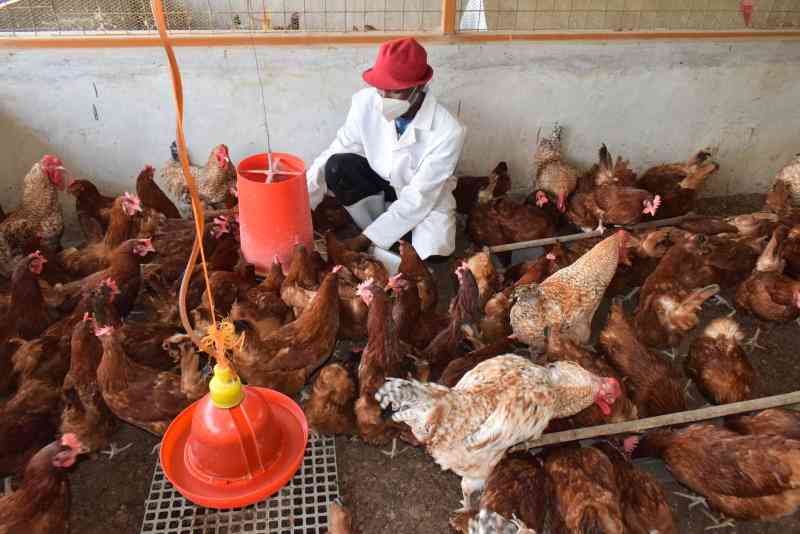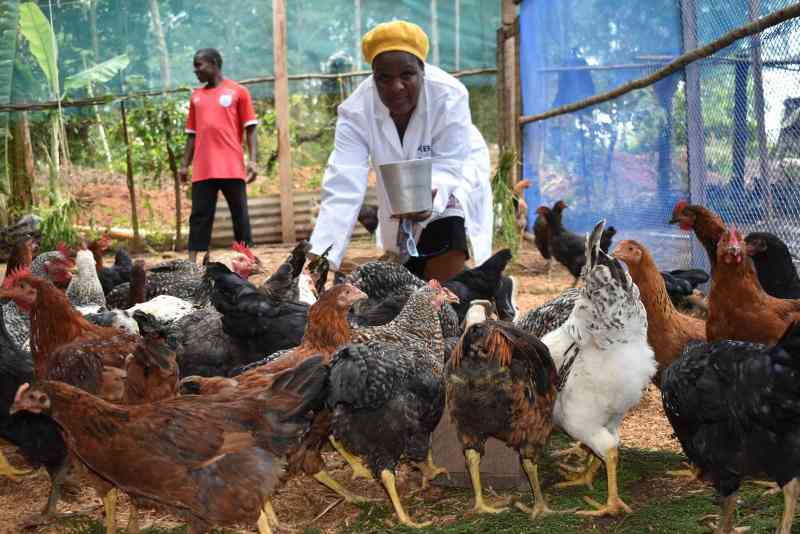Poultry feed is expensive and farmers know that too well. That‘s why a cheap and equally good option is great news.
Sam Ikwaye, a poultry farmer from Kilifi is using hydroponics to grow his affordable chicken feed.
“I have always been a poultry farmer so I know how expensive the chicken mash can be. Tired of buying the mash, I embraced hydroponics which saves me a lot,” says the farmer who keeps 700 birds which comprise chicken and guinea fowl on a 40 by 50 feet size plot.
Hydroponics he says cuts down his feeding cost by 70 per cent.
He explains: “I used to buy one sack of growers mash feed at Sh2,500 which would last for two to three days. Now for the same amount (the sack), we can make feed that can last two weeks,” he says.
“The water we use for irrigation is little and the same can be recycled for four days,” he adds.
“The good thing is that the feed is completely organic and contains high protein content. The feed also makes our birds mature faster, they produce higher quality eggs and the birds have good weight,” he tells Smart Harvest at his farm in Kiembeni, Bamburi.
So how does he do it?
“I soak the 8 kilos of seeds in water for some hours then drain in perforated containers. I then put them on the trays. The moisture that the seeds sucked in triggers the germination process. Within two days, the sprouts start appearing. Within six days, it’s a thick carpet with green foliage. I disintegrate, comb and give to the poultry,” he explains.
Ikwaye orders for the barley seeds from Narok or Nairobi. He buys a kilo of the grains at Sh40 which in turns yields up to six kilograms of fodder.
Enjoyable
The place where he grows the foliage is enclosed within a shade net (sourced from Amiran Kenya) to regulate temperature, mimicking a small greenhouse.
“Doing so prevents the growth of moulds and fungi,” explains Ikwaye.
The aluminum trays he uses can be improvised or bought at Sh700 and then a farmer will require racks which are inclined to allow the water to drain free.
The nutritional value of hydroponic fodder is also unrivaled as the fodder is rich in protein, B-carotene, trace elements and enzymes and the fodder is also 95 per cent digestible as compared to other commercial feed. He sells the chicken at between Sh1,500 to Sh3,000 because they are ornamental, and their eggs for Sh50 each.
“My chicken fetches very good money because they are of good weight and the meet is nutritious. There is a high market for organic chicken,” he says.
This feed also ensures the birds mature in four to five months instead of the conventional seven to nine months. They also begin laying eggs at six months.
Ikwaye’s indigenous chicken can be fed on hydroponic fodder as three quarters of their daily feed requirement while layers and broilers (exotic) can be fed on hydroponic fodder as a third of their meal.
The farmer also uses hydroponics to plant strawberries, tomatoes and lettuce.
Stay informed. Subscribe to our newsletter
Thanks to the convenience this method allows him (light labour and minimal attention), Ikwaye, who has a full time job, says he has time to juggle other roles.
“With this technology, farming is enjoyable as it makes work easier,” he says.
 The Standard Group Plc is a
multi-media organization with investments in media platforms spanning newspaper
print operations, television, radio broadcasting, digital and online services. The
Standard Group is recognized as a leading multi-media house in Kenya with a key
influence in matters of national and international interest.
The Standard Group Plc is a
multi-media organization with investments in media platforms spanning newspaper
print operations, television, radio broadcasting, digital and online services. The
Standard Group is recognized as a leading multi-media house in Kenya with a key
influence in matters of national and international interest.
 The Standard Group Plc is a
multi-media organization with investments in media platforms spanning newspaper
print operations, television, radio broadcasting, digital and online services. The
Standard Group is recognized as a leading multi-media house in Kenya with a key
influence in matters of national and international interest.
The Standard Group Plc is a
multi-media organization with investments in media platforms spanning newspaper
print operations, television, radio broadcasting, digital and online services. The
Standard Group is recognized as a leading multi-media house in Kenya with a key
influence in matters of national and international interest.






